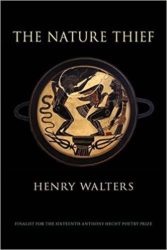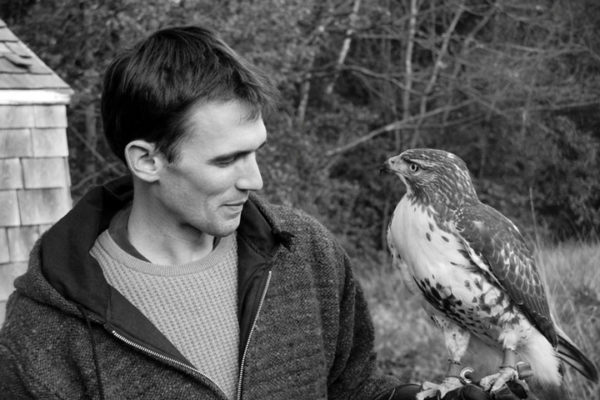Poetry Review: Henry Walters’s “The Nature Thief” — Memorable Verbal Acrobatics
By Jim Kates
The poems in this remarkable collection lead us, as all good literature should do, after all the appearances and misdirections, feints and antic dispositions, to nothing but ourselves.
The Nature Thief by Henry Walters. Waywiser, 96 pages.
 Henry Walters likes to pretend his poems are difficult. They are not easy, but that does not mean they are difficult. They are just intelligent, and demand intelligence from a reader. They are musical, and call for a reader’s attentive ear. “It takes all kinds of in and outdoor schooling,” Robert Frost cautioned, “To get accustomed to my kind of fooling.” He could have been writing about Walters’s second book, The Nature Thief, with its “atoms aquiver in each flake, / & quarks in the atom / quaking, & infinitesimal strings / inside each quantum.”
Henry Walters likes to pretend his poems are difficult. They are not easy, but that does not mean they are difficult. They are just intelligent, and demand intelligence from a reader. They are musical, and call for a reader’s attentive ear. “It takes all kinds of in and outdoor schooling,” Robert Frost cautioned, “To get accustomed to my kind of fooling.” He could have been writing about Walters’s second book, The Nature Thief, with its “atoms aquiver in each flake, / & quarks in the atom / quaking, & infinitesimal strings / inside each quantum.”
Those lines occur in “Crime Scene,” a poem that meanders Metaphysically to a simple conclusion:
What are
the odds a snowflake would come to rest
precisely here?
& the fact of its having happened—
everywhere.
We have heard this Metaphysical voice before, in the methodical madness of that juggler of words, Shakespeare’s Hamlet, and, in fact, Hamlet underlies all of The Nature Thief, from its introductory epigraph through the “rank offenses” of “Clue,” all the way to the “Readiness” of the last poem. The references are most explicit in the 15-poem title sequence:
So may you make the exits & entrances
you please.
So may your foil, making passes through &
into, making corpses, making souls,
make way for the wind to sing your obsequies.
Now, scarecrow, at a loss for breath,
I put fingers to your sides & find the holes.
We haven’t seen this kind of playfulness since Tom Stoppard’s Rosencrantz & Guildenstern Are Dead.
But this is the beginning, not the end of Walters’s poetry. His verbal acrobatics, like Hamlet’s, tend toward, if not a resolution, then at least a revelation of their own inadequacy, “the sound / of a black ball disappearing itself / off the edge of the known earth.” As the book proceeds, more and more of the poems in it end not with a definitive full stop, but with an indeterminate colon, as if they, too, were falling off the edge of the known earth into a conditional future. The final poem in the volume has no punctuation at all.

Poet Henry Walters and friend.
Like the postpositive articles of Walters’s favorite Greek grammarian, who is cited and mined as inspiration for a sequence in The Nature Thief, these poems are either confirmatory or inferential, pointing to something already mentioned or known, or to the present situation. Thus the deep and constant references to Hamlet, and thus also the immediacy of the effects.
And what is so uncertain? It is the domesticity of raising a family and planting a garden, however unweeded. At the very beginning:
In this book even unnaturalized
vetches & ivies hatch their mark,
earth-grafts grown rampant underfoot
like spikes for an actor who has died
in the play. Here, criss-crossing the dark
earth, I stood for you & wrote.
And at the very end:
the actor’s clothes books pretenses
lie
beside you the obsolete maps
of his arms
folded or spread
The provisional quality of the landscape and action is counterbalanced by the form and the careful craft: Walters has enormous confidence in the artificiality of the verbal artifact to contain the ambiguities of the universe. If sometimes the erudition of his references leaves the reader feeling that the poet is speaking to a ghost nobody else can see (“what a very singularly deep young man this deep young man must be”), the felt reality of the scene always asserts its sovereignty in a world of flesh and blood, with mortal consequences.
& what would spoil
I have made
enormous till it shines & can be held on to
like a ripe &
deadly thing embalmed
in the hollow of my hand.
Defying augury, and finding providence even in the fall of a grosbeak, Walters has presented his readers with a remarkable collection, resonant in content and — all the rarer these days — unique in voice. The poems here are cleaner and more focused than in his first book, Field Guide A Tempo, and lead us, as all good literature should do, after all the appearances and misdirections, feints and antic dispositions, to nothing but ourselves.
J. Kates is a poet, feature journalist and reviewer, literary translator, and the president and co-director of Zephyr Press, a nonprofit press that focuses on contemporary works in translation from Russia, Eastern Europe, and Asia. His latest book of poetry is Places Of Permanent Shade (Accents Publishing) and his newest translation is Sixty Years Selected Poems: 1957-2017, the works of the Russian poet Mikhail Yeryomin.
